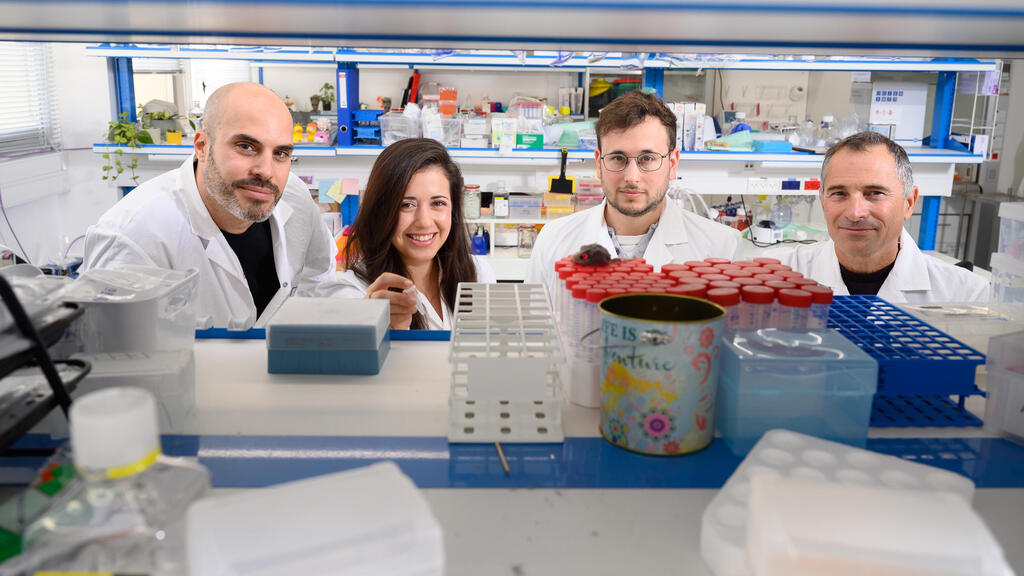Getting your Trinity Audio player ready...
In a groundbreaking Israeli study published in the scientific journal Cell, a novel approach to cancer treatment through immunotherapy is introduced. The research presents a new method that combines different types of immune system cells, specifically T cells and dendritic cells, for more effective cancer treatment.
Read more:
The study, conducted on mice with aggressive cancers in the breast, lungs, and skin, demonstrated a significant reduction in the growth rate of skin and lung cancers with the new treatment compared to the existing one.
1 View gallery


Dr. Rony Dahan, Yuval Shafir Itai, Oren Barboy, Prof. Ido Amit
(Photo: Weizmann Institute of Science)
However, breast cancer did not respond to the current treatment and also failed to respond to the new approach. Researchers attributed this to the extremely low number of dendritic cells, specialized cells that present antigens throughout the body, alerting T cells to foreign invaders or cancerous transformations. In response, they explored a combined treatment using a new inhibitor they developed, along with the existing treatment, to enhance the activity of dendritic cells in the tumor microenvironment.
The combined treatment proved to be effective, showing that even in cancers resistant to immunotherapy, the synergy between T cells and active dendritic cells induces a robust immune response against tumor growth. Notably, the scientists investigated whether, aside from the strong immune response, the inhibitor could also prevent the cancer from recurring in the future.
The researchers found that the new treatment was effective against the development of secondary tumors after the removal of the primary growth. They concluded that this suggests the inhibitor successfully generates a systemic immune response throughout the body against cancer, leaving behind memory immune cells that can identify and respond to cancer even after treatment.
Fighting both cancer and autoimmune diseases
"We are presenting a new approach that emphasizes a systemic view of immunotherapy," said Dr. Rony Dahan, who led the research alongside Prof. Ido Amit and other scientists from their laboratories in the Department of Systems Immunology at the Weizmann Institute of Science. "Instead of focusing on a single pathway, we are engineering inhibitors that serve as a platform for communication between different immune cells according to our selection. Essentially, we now understand that we can activate the immune system – allowing it to combat the disease on its own."
Dr. Dahan explained that they recognized the importance of cell communication early in the research, stating, "This understanding allowed us to develop a completely unique method. Our approach differs from others in the field; rather than developing treatments that target existing cells, we are creating a treatment that links two different immune cells." According to him, "Never before has such a treatment been developed that connects two cells of the immune system. This is a significant scientific breakthrough, and progress with engineered inhibitors is very exciting."
This breakthrough offers hope not only for cancer patients requiring immune system activation against tumors but also for individuals with various diseases, such as autoimmune conditions, where patients need targeted immune suppression without the broad and dangerous effects of general immune suppression. Dr. Dahan added, "Comprehensive methods for immune suppression exist, but I believe our innovative approach will enable the suppression and activation of specific immune responses without the broad and hazardous consequences of general immune modulation."
Regarding the continued development of the inhibitor, Dr. Dahan clarified, "It's a lengthy process, but we are focused on developing a drug suitable for human treatment. Alongside pharmaceutical companies, we are currently working on a molecule that will be suitable for humans." He also mentioned ongoing research in the field, stating, "There is enormous potential in this innovative approach. The understanding that we can engineer communication between different cells is groundbreaking. We encourage others to explore this in additional areas, allowing us to reach a new level of understanding of the immune system for the treatment of various diseases."

